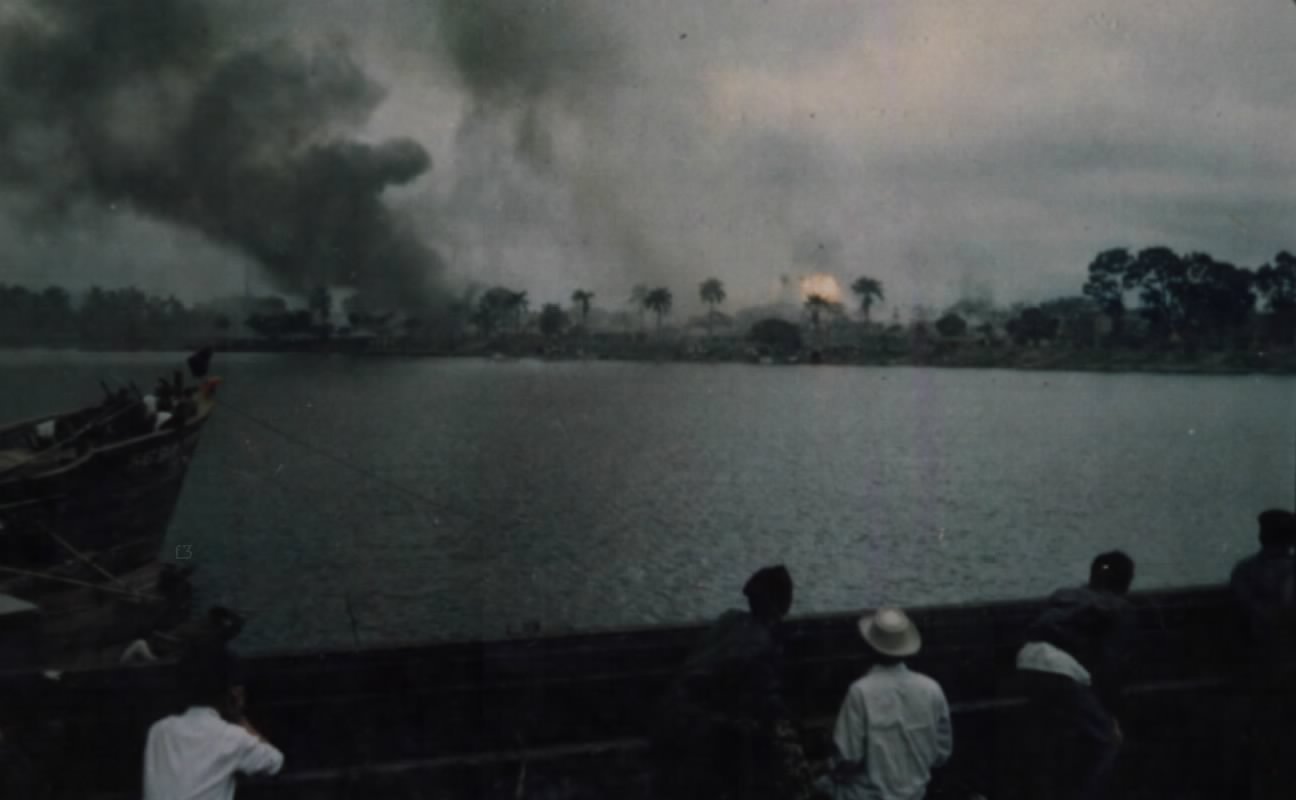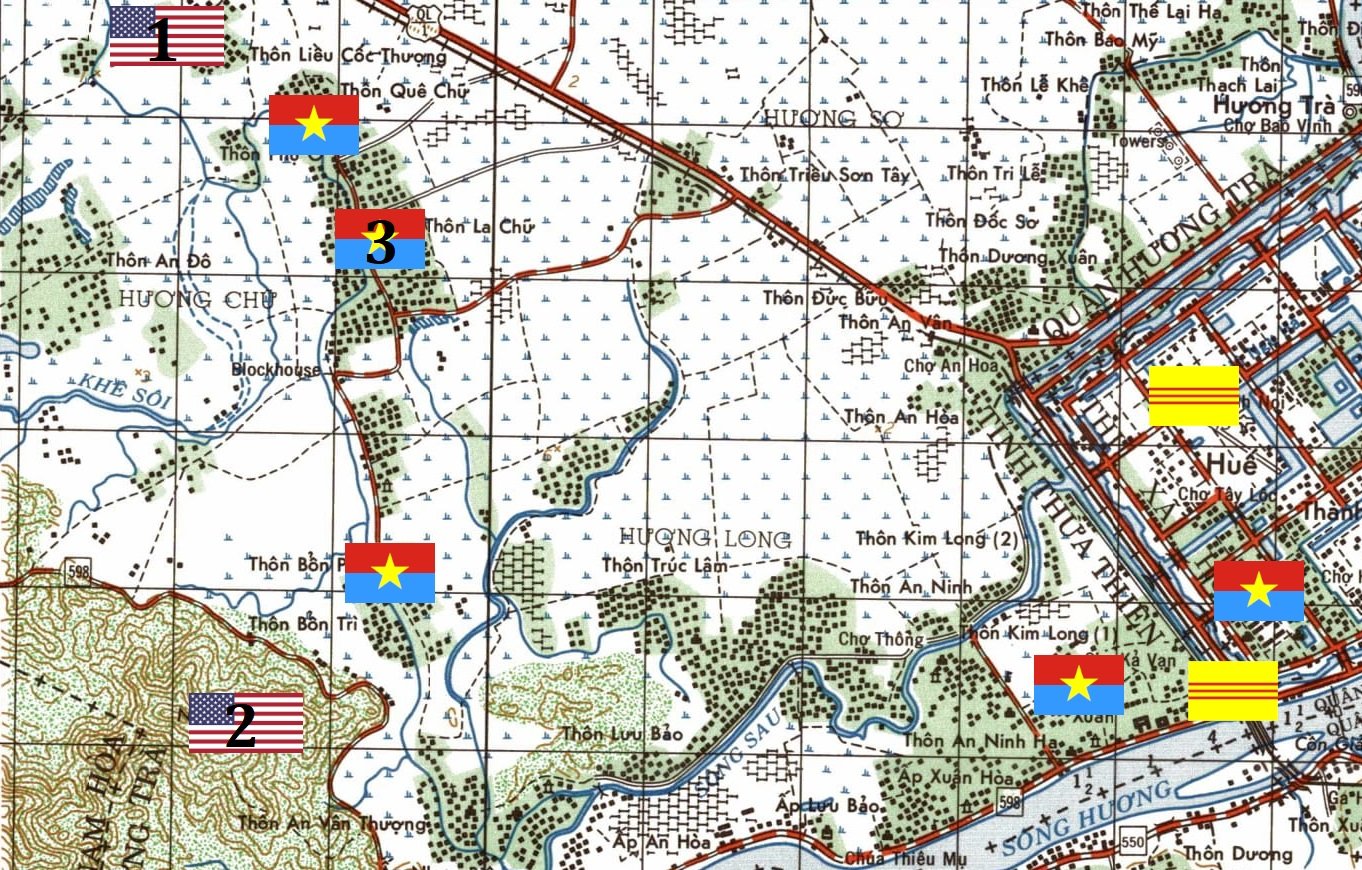February 7, 1968
Clearing the Triangle
Civilians watch from the riverbank as airstrikes hit the Citadel
US National Archives, Original Color
With the fall of the Provincial Administration Building the previous day, the NVA had been crippled in the Triangle, but was not defeated. The US Marines now set about clearing them from what remained of the Triangle, while the ARVN continued to hold in the Citadel. Meanwhile, the north, the US Army continued its push toward Thon La Chu.
An ARVN soldier stands guard atop one of the Citadel gates
USMC Photo
The Citadel
The day began in the Citadel with heavy fighting around the Chanh Tay Gate as the NVA attacked the men of 4/3/ARVN nearby. Despite heavy casualties, the ARVN holds the line, blunting the NVA counterattack. As the day progressed, RVNAF A1 Skyraiders were able to provide limited air support in the citadel, helping to take the pressure off the ground troops. Despite this, not furher gains would be made by South Vietnamese forces in the Citadel today.
The Citadel: 2-7-1968
Mang Ca - ARVN 1st Division Headquarters
Tay Loc Airfield
4/3/ARVN was hit by an NVA attack in the morning from the Chanh Tay Gate, but held its ground
Surrounded ARVN units continue to hold
Imperial Palace - NVA Headquarters
This morning NVA sappers succeed in collapsing the Nguyen Hoang Bridge
Citadel Gates - Flags indicate controlling faction
Civilian MACV employees assist in carrying in wounded Marines
US National Archives
The Triangle
As the sun rose behind its customary overcast on February 7 the city of Hue was blanketed in thick clouds of smoke, teargas and dust, with the stench of death permeating its blasted streets. The Americans had broken the 4th NVA Regiment the previous day, and today take a further two blocks with almost no resistance, as other Marine units fan out to clear the Triangle of the remnants of the NVA force. The main line of advance now was along the Phu Cam Canal, with the intention to secure or destroy the remaining bridges to cut off the NVA from both retreat and reinforcement. The main bridge, the An Cuu on Highway 1, remained destroyed, but today Major O. K. Steele swam across the canal anyway, with 75 more Marines in tow to reinforce the units active in the Triangle.
Civilians cross the destroyed Nguyen Hoang Bridge to escape the Citadel
Civilian refugees had been flooding into the area around MACV since the battle began, and by now resources were stretched to the limit. Most had been quartered in the Hue University campus, and the Marines were running out of additional rations with which to feed the civilians. In another area two figures approaching an American roadblock are almost shot, but but it becomes apparent that they are a heavily pregnant woman and an elderly chaperone. A corpsman helped to deliver the baby at the University, but others were not so fortunate. The Marines were generally very tightly wound, and any wrong move by Vietnamese as they approached checkpoints carried the possibility of being shot down. The VC had taken to wearing civilian clothes to approach the Americans before opening fire or dropping grenades, as well as to encourage the Americans to shoot civilians, as the political leadership both in the city and in Hanoi had come to realize that even if the military situation was falling apart, the political one was looking increasingly favorable.
1/1 Marines get some of the first hot food that has been available to them since they arrived in the city
US National Archives, Unknown Date, Original Color
The NVA considered the capture of Hue to be the only accomplishment of the Tet Offensive, and seeing the reaction of the Western press to the fighting in the city had scrapped their plans to withdraw, realizing that the political victory won by drawing out the carnage would be worth the materiel and manpower losses that would entail. The first phase of the Battle of Hue was coming to an end, but the city was still to see savage fighting in the days to come.
The Triangle: 2-7-1968i
MACV Compound - US Headquarters
Doc Lap Park LZ
LCU Ramp
Hue University - Now a refugee center, with over 5,000 present here today
Thua Thien Provincial Administration Building
Thua Thien Provincial Prison
US Marines push toward Phu Cam Canal
75 Marine reinforcements swim over the Phu Cam Canal near the ruined An Cuu Bridge
ARVN forces are moving into the American’s rear areas, showing a distinct lack of discipline.
The Hamlets
In the villages north of the city, 5/7 Cav prepared for an assault on the village of Thon La Chu, this time as part of a major force. General Tolson planned to attack the village with Vaught’s troopers, as well as 2/12 Cav, which was to march from their position at the ARVN outpost on Nui Nha Nhan to envelope the NVA at the hamlet from the south.
Also today, another helicopter was shot down near 5/7 Cav, and this time they were able to reach the crash site with supporting artillery fire from PK17. After extracting the crew and destroying valuable equipment, the cavalrymen withdrew back to their old positions. As the NVA have withdrawn completely from Thon Lieu Coc Thuong during the barrage, 5/7 Cav sets up there for the night, using the flashes of mortars in Thon Que Chu to spot additional artillery strikes throughout the evening.
The Hamlets: 2-7-1968
5/7 Cav remains around Thon Lieu Coc Thuong today as the NVA pulls back to Thon Que Chu
2/12 Cav remains at Nui Nha Nhan
Thon La Chu - NVA Thua Thien Hue Front Headquarters







